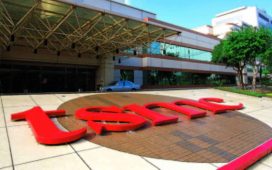By Elliott Nace | Staff Writer
Baylor student government passed a bill that opens negotiations for increased student and faculty access to Waco public transportation during its April 10 senate meeting. The ACCESS at Baylor Act, which will take effect at the start of the fall 2025 semester if approved, seeks to provide the university community with the Waco Transit System and have direct routes leading to off-campus academic buildings and other important locations throughout the city.
ACCESS is an acronym for Accessible Community Connections for Every Student’s Success. According to Westport, Conn. sophomore Spencer Yim, senator and diversity, equity and inclusion chair, the name reflects the project’s goal of leveraging student government as a tool to help students access the Waco community through the Waco Transit System.
“We’re finalizing details … for this initiative that will give every single Baylor student, faculty and staff member access to existing Waco Transit fixed routes, in addition to having a new [route] we [currently] call the Baylor loop,” he said. “It will encompass about a 30-minute loop of the Waco community, hitting all the hot spots that a typical student or staff member would need to hit — for example, H-E-B, the BRIC, the Piper School for Family and Child Studies, and then also the School of Social Work and some other locations downtown.”
Yim said the act will allow the entire student population to have universal access to Waco public transportation.
“Regardless of their socioeconomic status, regardless of what’s going on in their life, [students] can access the Waco community and really engage with the resources that it has to offer,” he said.
Yim and Plainview junior senator Mason Gregory proposed the bill, which passed unanimously last Thursday. According to Yim, the passing of the bill approved negotiations of contracts, pending the approval of the university and the Waco City Council, that will initially set aside $32,000 from the Student Government Allocation Fund to create a two-year pilot program for the ACCESS at Baylor Act. Once program specifics materialize at the end of the academic year, the student senate will hold a special session featuring newly sworn-in senators to allocate an additional $30,000 for the second year of the project.
“The hope is to roll it out in the fall of 2025 and begin to evaluate the student response,” he said.
Gregory said the incentive behind the bill stemmed from his correspondence with the Center for Global Engagement, which indicated to him that international students at the university often do not have access to transportation on a regular basis.
“It does cost about $400 per year to have a bus pass with the Waco Transit System,” he said. “Just international students alone make up about 950 students, so we already knew that there is going to be a need for at least 5% of the student population needing reliable transportation.”
According to Gregory, further data from the Office of Institutional Research revealed that 24% of Baylor students do not have a car registered with the university, which further affirmed the need for universal student access to transportation.
“After evaluating that and then the socioeconomic status of the university, we identified that some barriers to accessing the Waco community or grocery stores could be either socioeconomic or just not having any vehicle whatsoever,” Gregory said. “That was the heart of the project — eliminating those barriers.”
Yim said the student government’s collaborations with the full range of the university’s departments aims to serve students on a daily basis, which makes the implementation of new bills and acts essential to their success.
“We’re meeting this week with our student government adviser to formulate that plan — how we’re going to roll it out and in what manner — who’s going to be involved and creating a visuals package as well,” he said.
Gregory added that the act will be transformative to students who need greater access to Waco at large.
“It opens up free access to Waco Transit for all students, expanding essential transportation for food access, medical and dental care, and for many, simply getting to class,” he said.
This story will be updated as more information becomes available.









